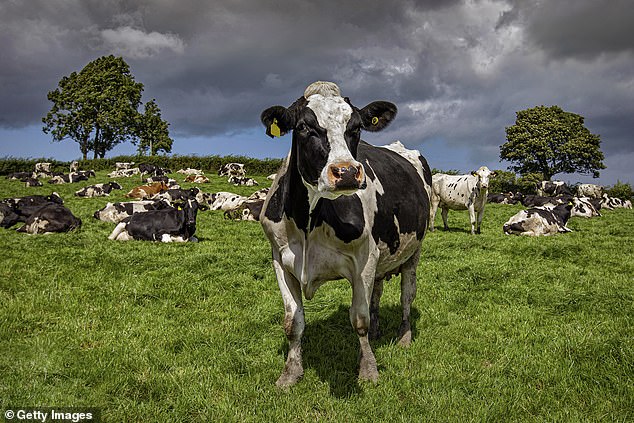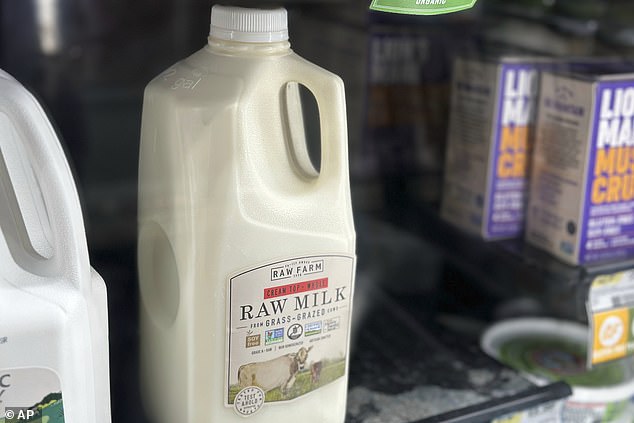Urgent ‘do not drink’ warning issued for trendy milk after alarming discovery of bird flu
A former government food safety expert is urging Americans to avoid raw dairy products following news that bird flu has been found in unpasteurized milk for the first time in California.
The state health department revealed that the H5N1 virus was found in a batch of whole, raw milk sold by Fresno-based dairy company Raw Farm and an emergency recall has been issued.
Dr. Darin Detwiler, a former advisor to the FDA and USDA, told DailyMail.com that people should definitely avoid raw milk and cheeses because they “do not undergo the heat treatment necessary to ensure safety.”
Raw dairy products are not pasteurized, a process that removes disease-causing germs by heating milk to a high enough temperature.
Although sales have been banned or restricted for decades for health reasons, they have benefited from a booming demand for organic products in recent years, with at least 4.4 percent of Americans (nearly 11 million people) trying raw milk every year.
Dr. Detwiler also warns that people should be extra vigilant with their turkeys this Thanksgiving due to the bird flu outbreak in poultry and to avoid desserts, salad dressings and other products that contain raw eggs.
According to the Ministry of Agriculture, more than 300,000 turkeys have been infected with bird flu this month alone.
And since 2022, the disease has infected nearly 7 million commercial and backyard chickens in the US.
Dr. Darin Detwiler, former advisor to the FDA and USDA, urges people to exercise caution amid the spread of bird flu

The virus was first found in California in unpasteurized commercial milk
Dr. Detwiler said it is “important to prevent cross-contamination by ensuring that raw poultry or bird products do not come into contact with dairy products in the refrigerator or during food preparation.”
The finding of bird flu in raw milk in California is significant because it is the first time bird flu has been found in commercial milk production.
Raw milk carries an inherent increased risk of foodborne illness, which is eliminated by the high-temperature pasteurization process.
The FDA’s long-standing recommendation regarding the consumption of raw milk is that it be considered a “high-risk food” due to these factors.
However, the government agency notes that “based on the limited research and information available, we do not currently know whether (bird flu) can be transmitted to humans through the consumption of raw milk and products made from raw milk from infected cows.” ‘
While research into this connection continues, Dr. Detwiler recommends consuming only pasteurized dairy products.
Likewise, the CDC warns that “unpasteurized (raw) milk and products made from raw milk, including soft cheese, ice cream, and yogurt, may be contaminated with germs that can cause serious illness, hospitalization, or death.”
When it comes to eggs, Dr. warns. Detwiler that these pose a “significant risk when it comes to exposure to the bird flu virus, especially in foods such as homemade mayonnaise, aioli, or certain dessert recipes (e.g., mousse, tiramisu). ‘

Food safety experts have warned against eating eggs with runny yolks as they are not properly cooked and could increase the risk of bird flu
He adds: ‘Until the bird flu crisis is under control, it is wise to avoid dishes containing raw or lightly cooked eggs.’
Salad dressings also pose a risk, so if you order some, the safest option is a simple olive oil or vinaigrette.
When it comes to poultry like turkey and chicken, the consumer food safety advocate says it’s important to make sure it’s handled properly before purchasing and that the packaging is intact.
While bird flu does not directly impact red meat, the Boston-based professor also notes that steakhouses “are not safe zones and cross-contamination risks may exist in mixed-use kitchens where poultry is processed.”
He adds: ‘Restaurants that serve both poultry and beef should be scrutinized for their food safety practices.
“If you are dining out, make sure the restaurant follows strict food safety protocols.”
To check a restaurant’s food safety rating in the US, inspection scores and reports are typically accessible through local health department websites.
For those who want to be extra careful, Dr. Detwiler says going dairy and meat-free is easier than ever with “lots of products to choose from.”
“Since there have been infections among dairy workers, it is worth considering alternatives such as plant-based milk and cheese,” said Dr. Detwiler, who previously served on the USDA’s National Advisory Committee on Meat and Poultry Inspection.
‘You can also stock up on vegetable salad dressings.’

The state health department revealed that the H5N1 virus was found in a batch of whole, raw milk sold by Fresno-based dairy company Raw Farm and an emergency recall has been issued
Regarding cooking turkeys, he says that “cooking poultry to an internal temperature of 175°F effectively kills the virus, making it safe for consumption.”
Other food safety tips he offers include “thoroughly washing hands, utensils and surfaces after contact with raw meat.”
In addition to dairy farms, poultry farms have also been crushed by the spread of bird flu.
An important aspect of controlling bird flu outbreaks, according to Dr. Detwiler, is the depopulation of infected flocks.
Fifty-five human cases of H5 bird flu have been reported in the U.S. this year, 29 of which were in California.
Last week, the CDC confirmed a human infection with bird flu in a child in California.
This is the first reported bird flu H5 virus infection in a child in the US.
Consistent with other human cases among adults, the child reportedly experienced mild symptoms and was given antiviral drugs for the flu.
Low levels of viral material were detected in the first sample collected, and follow-up tests of the child several days later were negative for H5 bird flu, but were positive for other common respiratory viruses.
The child is said to be recovering from their illness.
During CDPH’s investigation, the child’s family members reported having similar symptoms.

“Millions of chickens and turkeys are euthanized during outbreaks, and it takes time to repopulate these farms,” says food safety expert Dr. Detwiler.
Although they tested negative for bird flu, some family members were positive for the same common respiratory viruses as the child.
Contact tracing continues, but there is currently no evidence of person-to-person spread of H5N1 bird flu from this child to others.
To date, no person-to-person spread has been identified associated with the H5N1 bird flu cases reported in the US.
An investigation by the California Department of Public Health (CDPH) into the child’s possible source of H5N1 exposure is ongoing.
